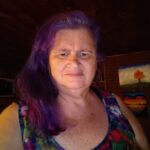By Kathleen Shea Kirstein
According to a 2009 study published in a prominent psychology journal, it takes 18 to 254 days for a person to form a new habit. It also takes 66 days for a new behavior to become automatic. I’ve been second-guessing every word that’s come out of my mouth for so long it’s as natural to me as breathing. I might say this obsession with doubting myself started when I first learned to talk. In school I was very quiet. In a yearbook I was described as quiet as a church mouse. I’ve always been this way—the heavy-set kid no one noticed.
One day in early February, when I was just a few days shy of my 50th birthday, I was working with the adoption coordinator of the Lund Family Center in Burlington, Vermont after only recently having learned I’d been adopted. For me it was painful to find out at 49 that I’d been adopted. And on top of the pain, there was the need to completely rebuild my identity from scratch. The foundation of my world had completely crumbled in those moments after this discovery. Rebuilding one’s identity is a never-ending roller coaster ride—exhilarating one moment and totally exhausting the next.
At the adoption coordinator’s urging, I’d received non-identifying information about my birth parents, so I knew the basics. My mother, who was of French-Canadian descent, was 32 when I was born. She was in good health, worked outside the home, and loved to knit. The file also noted that she was very helpful to the younger girls in the maternity home. I learned that my father, who was of Scottish descent, was also in good health, graduated from high school, and was an engineer.
I knew I had to ask my mother’s permission to search for biological family members. I called her and said, “ Mom, you know I always do what I am told. Leslie, the adoption coordinator, says I should ask for identifying information. I want your blessing. I want to make sure it’s okay with you that I take these next steps.” I can’t remember if I said this out loud or only thought about it: “It won’t change anything in our relationship.” Since she and my father confirmed that I’d been adopted, I’d been very careful not to give them even a hint that I was rejecting them. Mom assured me that it would be fine with her. And poor Dad. If mom said yes, he’d tag along, but he’d never actually been consulted.
I called the adoption coordinator and set the process in motion. I was required to write a letter to the probate judge for Burlington, Vermont, Chittenden County, requesting identifying information about my birthparents. Once the probate court denied my request, which is typical, Leslie would attempt to locate my birth mother. If she was successful and if my mother agreed to permit contact, then I would be asked to write her a letter. Once she responded, we would determine whether she was willing to meet me.
Talk about second-guessing! It felt as if there were so many places this could go wrong. My mother could resist being be found. She could decide that since I have been out of her life for 50 years, why let me back in now? She would be in her 80s. She could be dead. That would be so sad. What would it feel like, I wondered, to have all hope of contact gone. All hope of learning what she is like, what her family is like, who I look like? It’s an understatement to say it would feel like the rug was just pulled out from under my feet. It would be painful. It’s weird to know that I would grieve for someone I don’t know, except we were a team for almost nine full months. I decided for the moment it was best not to think about it and to go about my activities of daily living.
Leslie’s call came when I was at work. She wanted to tell me she found my mother, who lived in Florida. Then she called back to say whoops, she found the wrong mother. The first name and age were correct, but the Social Security number was off by one digit. I reminded myself to just breathe—that my job in that moment was just to take one breath after the other. A few days later on a Friday morning, Leslie called me again at work to tell me she’d found the correct birthmother. This time, everything checked out. My mother lived in Winooski, Vermont. Having never heard of it, I checked the map and found it was near Burlington. When we’d taken family trips to see my husband’s brother and his family in Rainbow Lake, New York, near Saranac Lake and Lake Placid, I loved when we’d go via Burlington. I never knew why I liked it so much, but it just drew me in and felt comfortable. After Leslie’s call, I knew why. I was born there. The roots of my ancestors grew in that Vermont soil.
Leslie advised me that it was time for me to write the letter to my birthmother, Helen. Her name is name is Helena, but everyone called her Helen. I only work a half day on Friday, so I spent all afternoon writing the letter. I sat at my computer and second-guessed every word as I typed. Should I tell my entire life story—49 years of information? Or should I just hit the highlights? What I said and how I said it would matter; this would be the first impression of me my birthmother will get. I wanted her to like me. But there was no one to guide me, to give words of support. Writing a letter doesn’t sound that hard, but for me—a champion second-guesser—it was very difficult. I wasn’t getting anywhere, erasing every word as soon as I typed it. Geez, what did you write that for? I asked myself. It sounds dumb. Don’t sound so full of yourself. Enough! I decided. I’d hit the highlights and let the rest go. But still, it took me eight hours to finish the letter. I imagine a person with less faulty thinking could have done it in two hours max.
At about the four-hour mark, my phone rang. It was my mother. “Hi Mom, sure pizza for my birthday supper sounds great,” I said. We chatted for a minute, but I have no memory of what we discussed because my brain had turned to mush. I managed to get myself back to my computer desk and into my chair. What had just happened? I could barely comprehend it. It felt surreal to be writing a letter to one mom and at the same time talking on the phone to the other mom. I thought my life could never be any stranger than it was in that moment. Wow, just wow. I had no other words. I couldn’t even think. I regained my composure, kicked my brain back into gear, and finished the letter. I took a moment to draw a red rose in a yellow vase in the Pointillist style. I hoped she’d like it. It seemed the right thing to do to personalize the computer paper.
The highlights only version of my life ended up taking three pages. Yes, Helena, your daughter is long-winded even when she’s trying to be concise. Too many words, like Mozart’s too many notes. If only I had equal talent.
Leslie called a few weeks later to say that my mother lived near her, so she actually dropped the letter off and read it to her. After time went by and no follow-up letter arrived, I asked Leslie if she could visit my mother and if I could tag along as Leslie’s associate. My mother didn’t have to know it was me. I just wanted to see what she looked like and who she was. The waiting was so hard. Leslie said I’d have to wait for the letter.
Finally, a card arrived in the mail. My mother told me my birthfather was tall and Italian. She hoped I was well, and she signed the card “Mama.” I just kept looking at the signature. I’d always called my mother Mom, so for Helen to sign it Mama seemed so right that all I could do was stare.
It was amazing for me to meet my biological mother and discover that we shared so many of the same traits. For her to cry was rare, and, similarly, I never cried. She has a great sense of humor, as do I. We share the same personality type. I am very much my biological mother’s daughter. That knowledge warms my heart.
Kathleen Shea Kirstein was born in Vermont and raised in New Hampshire. She lives in Troy, New Hampshire. She’s a late-discovery adoptee, a mother of two boys, and a registered nurse.


